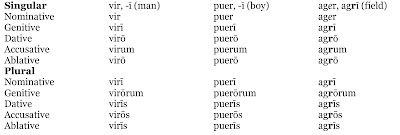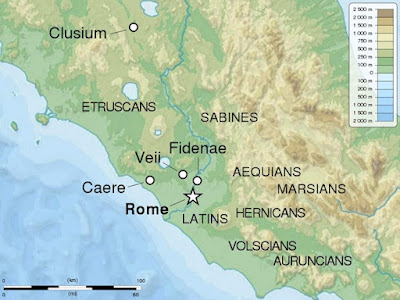The image posted here – courtesy of another member of the
group – contains examples of “New Latin”, sometimes known as Neo-Latin; this
will be discussed in greater detail in later posts.
https://en.wikipedia.org/wiki/Neo-Latin
Some of the vocabulary was coined in the post-Classical
period or refers to, for example, more specific types of food now e.g. pancakes
and biscuits, the true nature of which in Ancient Rome can be rather vague.
artolaganus, -ī [2/m]: used in the image to describe a
pancake; “a kind of bread or cake (made of meal, wine, milk, oil, lard, and
pepper” (Lewis and Short)
also: laganum, -ī [2/n]: again, definitions can be vague [i]
pancake; flat cake (Wiktionary) [ii] “a kind of cake made of flour and oil”
(Lewis and Short); laganumis from Anc. Gk. λάγανον (láganon)
meaning ‘thin broad cake; pancake’
https://neolatinlexicon.org/latin/pancake/
https://neolatinlexicon.org/latin/pancake_fritter_doughnut/
To see the issues pertaining to exact definitions of some of
these words, it’s worth looking at:
https://en.wikipedia.org/wiki/Tracta_(dough)
Tracta, tractum (Ancient Greek: τρακτὸς, τρακτόν), also called
laganon, laganum, or lagana (Greek: λάγανον) was a kind of drawn out or
rolled-out pastry dough in Roman and Greek cuisines. What exactly it was is
unclear: "Latin tracta... appears to be a kind of pastry. It is hard to be
sure, because its making is never described fully"; and it may have meant
different things at different periods. Laganon / laganum was at different
periods an unleavened bread, a pancake, or later, perhaps a sort of
pasta.
aurantium, -ī [2/n]: orange tree, the term used in scholarly
/ scientific writing post 15th century (more on this in later posts)
caf(f)ēa, -ae [1/f]: (New Latin) coffee
cereālia: cereals < cereālis, -e: pertaining to wheat
crustulum, -ī: biscuit; “small pastry; confectionary” (Lewis
and Short); from crustum, -ī [2/n]: cake; pastry; pie
saccharum, -ī [2/n]: (New Latin) sugar
cubicus, -a, -um: cubic; cubical
thea, -ae [1/f]: (New Latin) tea
tōstus, -a, -um: roasted; scorched; toasted





































